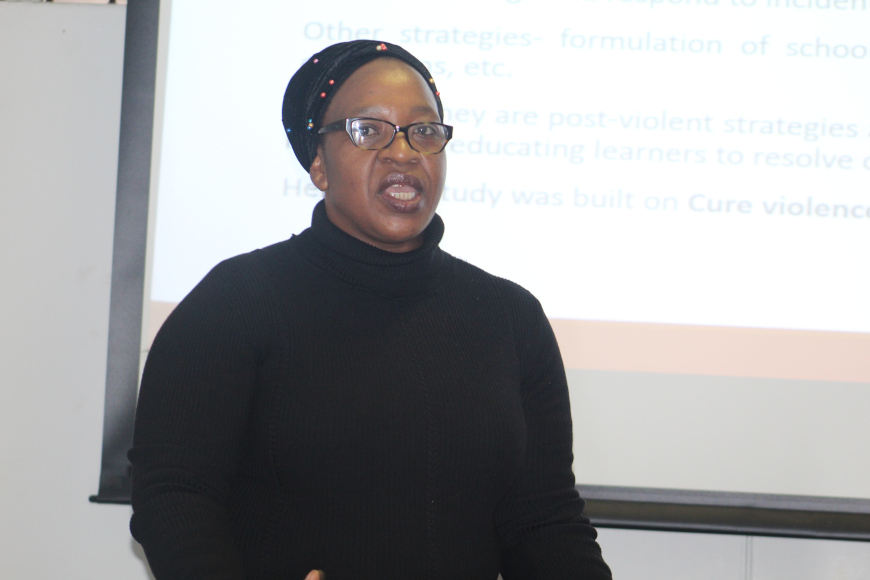“Most violent reduction strategies used by schools that I engaged with for my research, are post-violent strategies and focus on violence control measures rather than educating learners to resolve conflicts non-violently,” this was the assessment of Dr Zithobile Mkhize-Ngidi who was addressing a seminar on school violence on Wednesday, 03 October 2018 at the Durban University of Technology’s ML Sultan Campus.
Dr Mkhize-Ngidi said this observation is part of the reason why she believes that learners need to be taught about non-violence as part of their early childhood development. “I believe that if violent can be taught, then peace can also be taught. This is why I used the cure violence model for my research, and I would like to see it being incorporated into the curriculum for learners as early as in Grade R. This can be integrated into the Life Orientation subject, and teach learners about non-violence,” she said.
“The cure violence model maintains that violence is a learned behaviour and can be prevented by using disease control methods. Violence is similar to contagious disease in the following ways: violence clusters in certain areas much like a disease e.g. cholera, violence spreads like a disease and violence is transmitted through exposure. We need to view violence through a health lens and treat it as a health issue,” added Dr Mkhize-Ngidi.
She outlined some of the major causes of violence in schools. “Many factors contribute to violence at schools, including environmental influences caused by improper behaviour by the community. Learners resisting parents due to lack of parental skills, lack of awareness (by parents)- the use of negative forms of discipline. Influence of poverty because poverty kills people’ morality and peer influence as peers’ influence attitude and behaviour. Romantic relationships are also a cause of violence. Cultural and religious differences also cause conflicts resulting in violence in schools,” explained Dr Mkhize-Ngidi.
Dr Mkhize-Ngidi said violence in schools has severe consequences including physical damage, psychological implications, negative impact on the culture of teaching and learning as well as societal breakdown.
She said the study also discovered that the trends of violence are very broad. “The violence can be from educator to learner or learner to educator, parent to educator, parent to learner, educator to educator and learner to learner,” said Dr Mkhize-Ngidi.
She indicated that her research revealed that the common forms of violence in schools include bullying, theft of properties, substance abuse, sexual violence, vandalism, physical violence, gang-related violence, cyber-bullying, gambling and religion bashing.
The seminar broadly deliberated on the content of the research conducted by Dr Mkhize-Ngidi for her thesis in fulfilment of her PhD in Public Administration (Peace Studies) from the Faculty of Management Sciences at DUT, which was recently conferred to her during the Spring Graduation.
Commenting on her academic journey and possible prospects emanating from her research, she said, “My journey was long, exciting, frustrating, full of challenges, lonely and scary. My biggest wish is to influence the curriculum to teach children to deal with their emotions in an acceptable way.”
Pictured: Dr Zithobile Mkhize-Ngidi
Nduduzo Ndlovu


